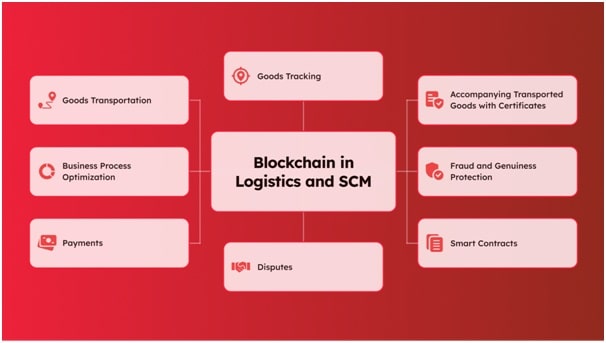
Сlient happiness prioritization is critical in today’s corporate environment. Businesses of all sizes should emphasize establishing an excellent client experience by implementing customer service into their operations if they want to prosper.
Such actions are intended to improve critical services and promote consumer loyalty to the brand. The need for business transformation in the digital era is evolving. This is especially true in businesses where technological complexity crosses with a strong focus on customer satisfaction.
Logistics is a good illustration of this kind of industry. One distinct supply chain development peculiarity is the growing usage of blockchain and the Internet of Things (IoT) for integration. Digitization is required for both corporate expansion and long-term survival.
Logistics Success with Blockchain and IoT
The digital revolution of logistics and supply chains, including blockchain and IoT trends, will be covered in this post, along with examples of how these technologies might enhance customer experience.

Integration of Blockchain into Business Processes
Integrating cutting-edge technology into logistics and SCM is a vibrant and long-lasting trend paving the way for a better future. Blockchain technology advantages include increased customer satisfaction via transparent control, higher security, and real-time process improvement.
This know-how may help businesses build trust between shippers and consignees while streamlining decision-making processes. All the parties involved have access to real-time data.
Implementing blockchain technology into logistics and supply chain management affects supply chain business intelligence and benefits companies. The technology is often utilized to boost technical processes, such as:
- Various items’ shipping, tracking, and accreditation
- Optimization of business processes (e.g., document flow, delivery routes, etc.)
- Security improvement (e.g., fraud prevention and authenticity assurance)
- Distributing payments, dealing with smart contracts, etc.
Let’s now examine how blockchain functions in SCM and logistics.

Blockchain enables consumers to do the following things, among others:
- Identify the source of the goods: for example, a diamond’s serial number may be cut, and Blockchain enables a buyer to quickly and easily identify a gemstone.
- Please verify that the merchant owned the item and wasn’t stolen (with the help of the docs accessible to the public).
- Conduct moral purchases (e.g., avoid buying sapphires from Madagascar that were extracted using child labor abuse), etc.
How Internet of Things is Used For Logistics Purposes
The Internet of Things and supply chain management is increasingly being discussed together. Due to its ease and capabilities, supply chain management technology has emerged as a significant trend in logistics.
The Internet of Things (IoT) is a technology that connects hardware, network information, and software. It is now widely used in many industries, from smart houses to managing industrial gas pipelines. End devices can transfer data instantaneously and allow the parent firm to gather and analyze information at a reasonable cost.
IoT systems make use of information about physical items, especially those that are in motion. Supply chain solutions equipped with IoT assist numerous business processes and make it easier for them to be improved.
Furthermore, by applying business intelligence for supply chain management, Internet of Things (IoT) apps have a greater chance of succeeding.
All parties involved may communicate data more easily, thanks to this technology. Data is rapidly and securely shared. By integrating IoT technology into supply chain operations, businesses may enhance their decision-making procedures and better control the movement of their freight.
Data from the IoT supply chain may be sent to various destinations, including the dispatch center and the company owner’s mobile device. The solution helps to reduce wait times, adjust to changes on the fly, and improve procedures in real-time.
This system provides sensitive item security and the ability to trace container movements and access. IoT enables precise control of transportation routes, optimization of freight expenditure, detection and suppression of fraudulent conduct, and improved fleet management.
Instead of relying exclusively on periodic inspections, this strategy employs predictive and Condition Based Maintenance (CBM) approaches. Companies may forecast trends linked to typical truck failures, get notifications about probable malfunctions, and uncover flaws before they reach a critical stage by analyzing truck performance.
Blockchain and IoT in The Logistics and Supply Chain Activities
Implementing the Internet of Things and Blockchain technologies in logistics is worth investigating. Data from IoT end devices must be processed and sent efficiently, and information security must be maintained by all the parties involved.
Through multiple IoT use cases, Blockchain is an effective solution for various supply chain problems. With the use of distributed ledger technology (DLT), data may be stored securely and widely while maintaining an unalterable record. This enables everyone to demonstrate work accomplishment for their gain.
Using DLT may provide legal certainty and keep an eye on crucial aspects of commodities throughout storage and transit, such as the humidity and temperature.
Maintaining consistent data across the Internet of Things supply chain is critical. Today’s logistics facilities include sensors and IoT endpoints, which communicate data to control centers.
The management and transmission of massive amounts of data are efficiently handled by Blockchain technology. The following are permitted for logistical companies:
- Connect and manage IoT devices effectively.
- Utilize smart contracts to pay for obligations and costs
- maximize supply chain transparency
- Reduce the possibility of data theft and hacker assaults.
Information is securely stored on the Blockchain, making it unavailable to attackers and available to all parties participating in the arrangement. Businesses may complete transactions, terminate contracts, and monitor requirements combined with IoT.
Summing Up
The logistics industry is experiencing significant growth in innovation trends.
The implementation of Blockchain and IoT, as well as modernizing legacy systems, may require significant resources. However, it can enhance the reliability and transparency of all supply chain processes to an unprecedented degree.
Digitalization directly impacts customer satisfaction, which is a crucial aspect to consider. A skilled software development company can help you digitalize your logistics processes.
The specialists will answer all your questions concerning IoT and Blockchain implementation into logistics processes and provide you with a cutting-edge, user-friendly and profitable logistics and supply chain management app.
Author’s bio:
Yuliya Melnik is a technical writer at Cleveroad. It is a web and mobile app development company in Ukraine. She is passionate about innovative technologies that make the world a better place and loves creating content that evokes vivid emotions.



